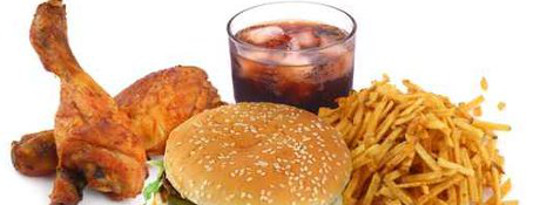
Genes, Junk Food and Weight
by Harrison Wein, Ph. D. Researchers gained new insight into how genetics may influence obesity by studying how the mouse equivalent of a fast-food diet affects different mouse strains. The findings may help explain why some people gain weight more easily than others.
Excess Weight Can Raise Your Health Risk
Excess weight can raise your risk for type 2 and gestational diabetes, heart disease, cancer and other health problems. But maintaining weight is difficult for many people. Body weight reflects the balance between the amount of energy consumed and the amount the body uses. But the body’s metabolism can change as you lose weight and alter your exercise habits. These changes may differ significantly among people, depending on genetics, age and other factors. Recent evidence also suggests that gut microbes play a role in obesity.
Dr. Brian Parks and Dr. Aldons J. Lusis at the University of California, Los Angeles, set out to explore the factors affecting the body's response to a high-calorie diet in mice. They fed about 100 inbred strains of mice a normal chow diet until 8 weeks of age. For the following 8 weeks, they gave the mice a diet designed to represent a typical fast food diet, with 32% of calories from fat and 25% from sugar. The study was supported in part by NIH's National Heart, Lung and Blood Institute (NHLBI) and National Institute of Diabetes and Digestive and Kidney Diseases (NIDDK).
The team saw a wide range of body fat across the mouse strains even during the normal chow feeding stage. The response to 8 weeks of a high-fat, high-sugar diet also varied widely. Mice eating the “junk food” diet had increases in body fat ranging from none to more than 600% higher than mice who continued to eat a normal diet.
Get The Latest By Email
More Than 70% Fat Differences Could Be Genetics
The researchers found that food intake correlated with body weight and lean mass. However, intake levels didn't account for the body fat changes seen with the high-fat, high-sugar diet. The investigators estimated that more than 70% of these body fat differences could be attributed to genetics.
To identify specific regions associated with obesity, the scientists performed a genome-wide analysis of about 100,000 genetic variations, or single nucleotide polymorphisms (SNPs). They found 11 regions that were associated with obesity. The regions contain several genes with known links to fat biology and metabolism in mice. Some have been linked to obesity in humans as well.
The researchers also analyzed gut microbe populations. They found that some mouse strains had large microbial shifts after eating the high-fat, high-sugar diet. Other strains of mice, however, showed little fluctuation. This finding shows that genetics strongly influences changes in gut microbes in response to diet.
Body's Response To High Sugar Diets Have Strong Genetic Component
Our research demonstrates that body fat responses to high-fat, high-sugar diets have a very strong genetic component, and we have identified several genetic factors potentially regulating these responses,” Parks says. Overall, our work has broad implications concerning the genetic nature of obesity and weight gain.
The researchers now plan to explore the specific roles these genetic factors play in the interactions between diet and body weight. Article Source: NIH Research Matters










